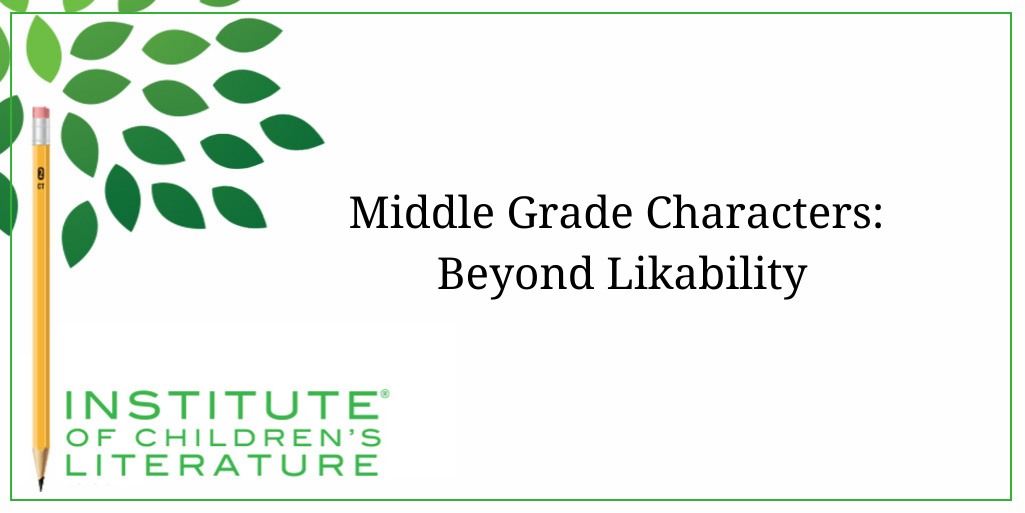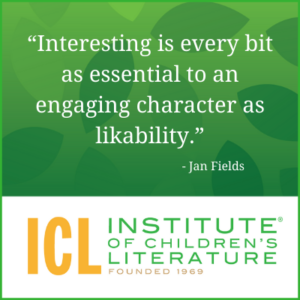
5 Ways Writers Can Prep for 2025 Goal Setting
Before we roll on to the new writing year, let’s harness our optimism for the blank slate before us and prepare for our 2025 Goal Setting just for writers.

We teach our students how to write and get published!
View our Course Catalog >
Advice on character creation often talks about likability. Many writers find that agents and editors will both comment on the likability of a character. By and large, this is because a character who is likable is often engaging, holding a reader in the story, and keeping them turning pages to learn what will happen with this character. That engagement is essential, because readers need to care.

Certainly, a character we can like will tend to be engaging, but likability isn’t everything. We can like a nice person even if we don’t really want to spend time with that person. In fact, we can end up feeling guilty when we find ourselves avoiding perfectly likable people in real life because they’re boring. Likable doesn’t always mean interesting. And interesting is every bit as essential to an engaging character as likability.
Sometimes we can find a character interesting, compelling, and engaging even if they are not completely likable. For example, a funny character is often engaging, even if the character has some strongly negative traits. Equally, an admirable character can be very engaging, even if the character contains unlikable traits. So let’s look at the complex middle grade characters who aren’t really likable, and how they can play a part in grabbing the reader and holding on.
Any children’s librarian in the country can tell you that readers love humor. One of the most heard questions when a librarian suggests a book is often “Is it funny?” That means that a funny main character is automatically engaging even when he isn’t altogether likable. Sometimes it’s the character’s unlikable traits that help make him funny. This is especially true when you have a book series where lots of terrible things happen to the main character for the sake of humor such as in the case of Diary of a Wimpy Kid or Timmy Failure. When the main character is going to be roughed up a bit by the plot, it can help if we don’t relate too much to the character or feel terrible for him. It’s not funny if it provokes too much sympathy.
This is why main characters in humor books are often a little bit unlikable, or at least seriously flawed. The flaws make them interesting and usually lead to the mishaps that drive the humor. These middle grade characters are usually more than a little self-absorbed and sometimes (as with Timmy Failure) comically lacking in self-awareness. If you simply listed traits for these characters, they certainly wouldn’t seem likable. As we follow them through book after book, sometimes there is some transformation to make them more likable, more relatable, but that gap in true likability is often necessary to make the books work, and doesn’t keep the books from being a hit.

Every kid with any level of self-awareness knows that sometimes he isn’t being very likable. In fact, sometimes the character traits that make us who we are also generate those unlikable moments or throw us into trouble.
When readers recognize these traits in a character, the character becomes someone readers can relate to. And that makes them engaging, even if their actions are making them hard to like (at least in the moment). The character may be impulsive, for instance, which can lead to some of the perils of the plot but also offers a point of connection. An impulsive character may say things they regret, blurting out hurtful comments without thought. Hurting others is an unlikable action, but when the thing that generates that negative experience is so relatable, the connection and engagement between reader and character stands.
So as you create the middle grade characters that will carry your story, don’t worry too much about likability. Readers will like a story when you make the main character driving it compelling and engaging. So ask yourself:
If you have created someone who keeps things interesting, likability will take care of itself.
With over 100 books in publication, Jan Fields writes both chapter books for children and mystery novels for adults. She’s also known for a variety of experiences teaching writing, from one session SCBWI events to lengthier Highlights Foundation workshops to these blog posts for the Institute of Children’s Literature. As a former ICL instructor, Jan enjoys equipping writers for success in whatever way she can.

Before we roll on to the new writing year, let’s harness our optimism for the blank slate before us and prepare for our 2025 Goal Setting just for writers.

Writers can be thin-skinned when it comes to getting feedback on their work. Let’s look at 4 ways to positively deal with constructive criticism!

Rejection is part of the territory when it comes to being a writer. Today we offer reflection for writers to help redirect your efforts after a rejection.
1000 N. West Street #1200, Wilmington, DE 19801
© 2024 Direct Learning Systems, Inc. All rights reserved.
1000 N. West Street #1200, Wilmington, DE 19801
© 2024 Direct Learning Systems, Inc. All rights reserved.
1000 N. West Street #1200, Wilmington, DE 19801
© 2024 Direct Learning Systems, Inc. All rights reserved.
1000 N. West Street #1200, Wilmington, DE 19801
© 2024 Direct Learning Systems, Inc. All rights reserved.

1000 N. West Street #1200, Wilmington, DE 19801
© 2025 Direct Learning Systems, Inc. All rights reserved.

1000 N. West Street #1200, Wilmington, DE 19801
©2025 Direct Learning Systems, Inc. All rights reserved. Privacy Policy.
3 Comments